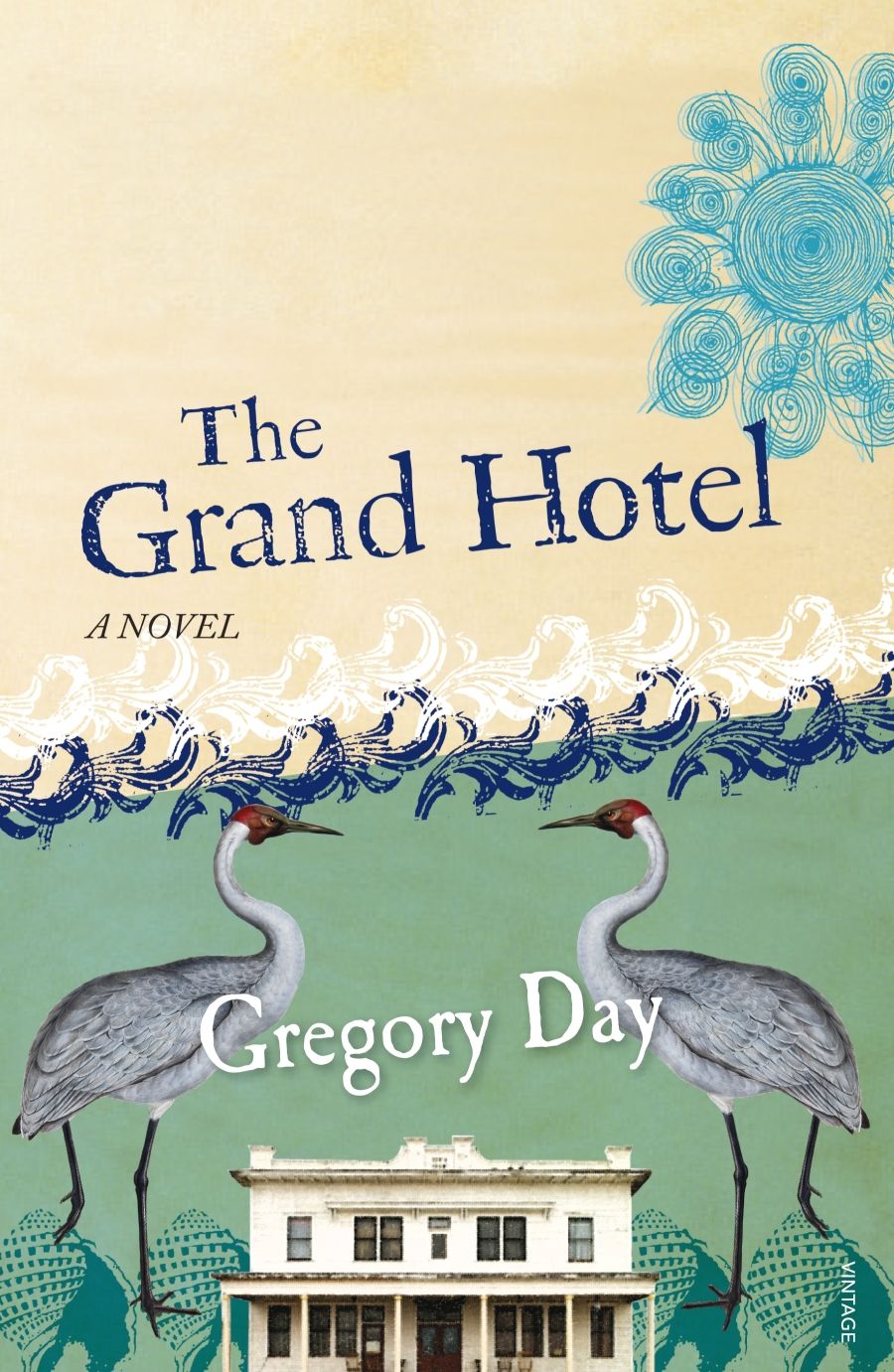
- Free Article: No
- Contents Category: Fiction
- Review Article: Yes
- Online Only: No
- Custom Highlight Text:
According to the author’s note at the end of The Grand Hotel, this will probably be the last of his stories to be set in fictional Mangowak, a coastal town in south-western Victoria. The first, The Patron Saint of Eels (2005), won the 2006 Australian Literature Society Gold Medal. The second, Ron McCoy’s Sea of Diamonds (2007), was shortlisted for the 2008 New South Wales Premier’s Prize for Fiction.
- Book 1 Title: The Grand Hotel
- Book 1 Subtitle: A novel
- Book 1 Biblio: Vintage, $32.95 pb, 470 pp
In the same radio interview, Day revealed that his was a happy Australian-Irish Catholic upbringing. This explains one exotic practice at the Grand Hotel: everyone must listen to a blessing from Pope Benedict during Happy Hour. He also quotes Fr Thomas Berry, an eco-theologian who says, ‘The most important relation these days maybe is not human to human but human to earth’.
In The Grand Hotel, it is Noel’s sense of displacement that reduces him to depression and what he describes as a Reverse Pinocchio syndrome, because of which, instead of becoming a more sentient being, he begins to resemble a wooden marionette, with not even a discernible heartbeat to rouse him from a spiritual coma. Noel, for nearly ten months, goes bush, sleeping rough, at the mercy of the elements, mosquitoes, and ants. He is only freed from his malaise by a chance encounter with a dancing brolga. The enchantment of this spectacle rouses him and he experiences an epiphany, realising that it is not he who is out of focus with the world, but that the fault is with reality; specifically, the depredations made by the shire council on the natural Mangowak environment. These, with absurdist economic rationalist decisions, invite cashed-up newcomers, but have no relevance to the town.
Consequently, when Noel returns home via the Mangowak blowhole, a more enlightened man, he is open to the suggestion made by Kooka, his mate and the local historian, that they replace the only legitimate community meeting place, the recently demolished town pub, with another. Built on the scale of the original, this will be a Grand Hotel fashioned from his own family home, which was destroyed a hundred years ago in a mysterious fire.
An artist and unlikely publican, Noel decides that the Grand Hotel will have some modernist touches, such as a Duchamp-inspired Talking Urinal and other Dadaist flourishes based on the work of the poet-pugilist Arthur Cravan. The loquacious pissoir starts its life with the ‘Irridex’ manifesto: ‘The Index of Local Irritation by Tourism.’ However it also has a studio archive, to which anyone may contribute, provided they do not dampen the ‘effervescence of the Dada spirit’. Thus this toilet could technically seduce its patrons with poetry; it could inform them; or it could even exhort them to some kind of direct action; simply because they have quaffed a few Dancing Brolga Ales.
A number of colourful locals and visitors frequent the hotel: people like Givva Way, The Blonde Maria, The Lazy Tenor, Veronica Khouri, Rennie Vigata, a gangster from Melbourne, and barman Joan Sutherland – whose name is actually Gene. Mangowak’s Joan Sutherland cannot sing a note in tune but is a big bastard, and every country pub needs a legend. The stories around these characters are mostly funny and lend a picaresque quality to the chaotic saga of The Grand Hotel, as do the short, aptly titled chapters, all forty-three of them; but it is Kooka who transforms the novel into a locally grown example of magic realism.
Though no one ascends into heaven while hanging out their washing, there is the matter of Kooka’s transistor, which broadcasts the old man’s dreams. These phantasms solve several mysteries – teasers early in the novel – recalling George Santayana’s aphorism that those who do not remember their history are doomed to repeat it.
Magic realism, associated with novelists such as Gabriel García Márquez and Isabel Allende, encompasses untenable political realities of the twentieth century. It suggests that magic is as believable as the monstrous acts that harm people. However, these acts are absurd and self-defeating. The jokes and humour of The Grand Hotel lighten Day’s ever-present concerns about environmental destruction, which, because it is less obvious, is even more pernicious than a military junta, leading to the inexorable extinguishment of the human and, indeed, of most other species. This dilemma, whether viewed post- or ante- an epiphanic brolga dance, does seem a pretty absurd proposition.


Comments powered by CComment